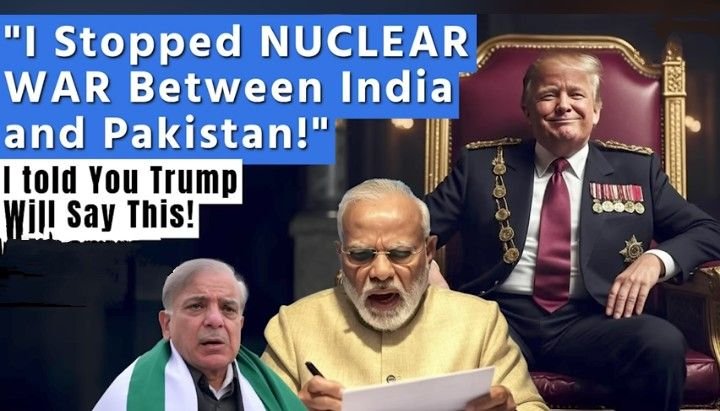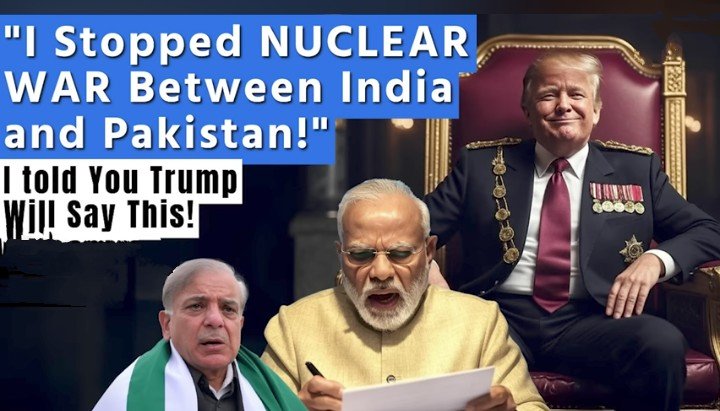
Donald Trump’s Claim of Averting a Nuclear War Between India and Pakistan: A Critical Overview Today, we dive into a powerful and controversial statement made by former U.S. President Donald Trump — a claim that he prevented a potential nuclear war between India and Pakistan. Let’s understand the deeper context, the reactions from different sides, and what this means for geopolitics.
Trump’s Bold Statement: A Nuclear War Averted
Recently, Donald Trump publicly declared that during a highly tense period between India and Pakistan, his administration helped broker a ceasefire, effectively stopping a potential nuclear conflict. In his words, this was a “historic event” and a “dangerous conflict between two nations with lots of nuclear weapons.” He emphasized that the U.S. helped “a lot” and suggested that both India and Pakistan exercised restraint and wisdom — a claim he read from a prepared statement, underscoring its official nature.
Trump’s supporters have already started touting him as a global peacemaker, some even suggesting he deserves the Nobel Peace Prize, comparing this moment to when Barack Obama received the same award shortly after becoming president.
India’s Reaction: Unease and Disagreement
While Trump’s statement is dramatic, it hasn’t gone down well with the Indian government. India has categorically rejected the notion of a “permanent ceasefire” as declared by the U.S. administration. Moreover, New Delhi is reportedly unhappy with Trump repeatedly referencing a nuclear conflict scenario.
Why? Because it inadvertently lends credibility to Pakistan’s nuclear threat, something India has tried to downplay in global discourse. Recently, India even stated that it will no longer tolerate “nuclear blackmail” and won’t be swayed by such threats in the future.
The U.S. Motivation: A Broader Strategy?
Some defense analysts suggest that the U.S. had deeper interests in preventing further escalation. There is speculation that Washington feared India’s targeted bombings on Pakistani airbases could render some of those strategic locations unusable — locations that the U.S. might potentially rely on in a future confrontation with Iran.
This raises the possibility that the U.S. wasn’t just acting as a peacekeeper but was also protecting its long-term military and strategic interests in the region. Moreover, significant U.S. aid and maintenance funds have gone to support Pakistan’s F-16 fleet — aid that is expected to be reciprocated, perhaps in the form of military cooperation in the future.
Media Coverage and U.S. Scholars’ Views
Major global media outlets like CNN and BBC covered Trump’s statement, highlighting the U.S.’s role in de-escalation. Meanwhile, several U.S. scholars had already predicted that Trump might offer India a favorable trade deal to help cool tensions. Trump himself alluded to increased trade talks as part of his efforts during the crisis.
Tariffs and Trade Tensions: Coincidence or Response?
In an interesting development, India has recently warned the World Trade Organization (WTO) that it may impose retaliatory tariffs on American steel and aluminum products. Some speculate whether this move is a response to Trump’s repeated “nuclear war” comments, which India perceives as undermining its regional stature.
However, others argue it’s just a regular trade maneuver unrelated to geopolitical tensions — similar disputes have occurred even during Joe Biden’s tenure.
What Lies Ahead?
Trump’s statements may serve political purposes, but they also shape international narratives. If such claims go unchallenged, they might skew global perceptions about the balance of power in South Asia. While the reality of a nuclear war being “averted” remains debatable, one thing is clear — geopolitics in the region is deeply layered, and rhetoric from global leaders can have far-reaching implications.
Bonus Question for You All!
Recently, a prominent Indian cricketer announced his retirement from Test cricket after a 14-year-long career. Who is he?
Options:
- Jasprit Bumrah
- Ajinkya Rahane
- Cheteshwar Pujara
- Virat Kohli
Drop your answer in the comments! Correct answers will get a heart from us.
